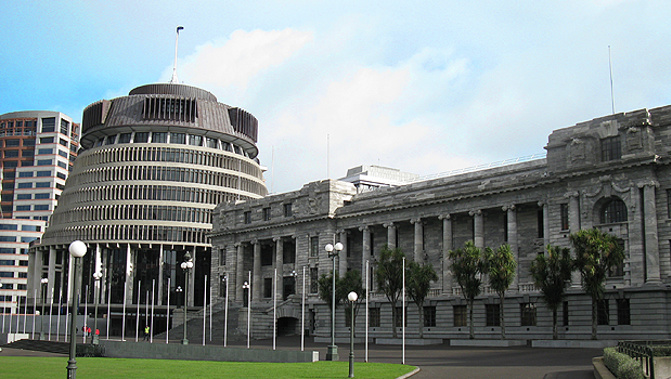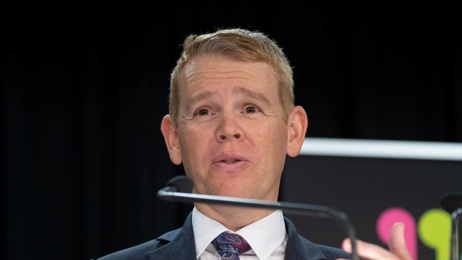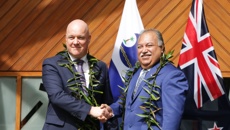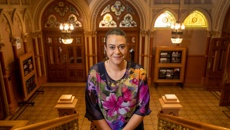
There are almost 500 square tiles on the floor of Parliament's Bowen House lobby.
There are 813 black and white tiles on Parliament's second floor and a further 227 in the Beehive basement.
How do I know this? Back in 2017 I helped count them.
I did not do it for fun, nor was I assigned busy work by an editor who needed the information for a colour piece.
I helped count them because I was bored. So, so very bored.
It was October 2017 and the eyes of the nation were on Winston Peters, who had secured enough votes to be King Maker.
For weeks, Peters and his team bounced between National and Labour in negotiation rooms within the Parliamentary precinct.
For the media, every day was gruelingly similar: We waited.
Waited for Peters and his entourage to make the 17-second walk between the lifts they had descended from, to the doors that lead to the corridor where he would make his way to the negotiating room.
That 17 seconds was usually chaos.
Peppered with questions from half a dozen reporters – the press pack would attempt to decipher Peters’ comments before he made it into the safe zone.
Sometimes he would stop to talk, dropping small hints as to what was discussed in the meetings. It would infuriate both National and Labour camps to no end.
Fast forward six years later, and today it’s a very different story.
As Kiwis waited for the special votes to be tallied, there were no tiles to be counted as Press Gallery reporters waited; coiled and ready to pounce on Peters as he made a break for safety.
That’s because there is nowhere to wait.
Chris Luxon’s tactic of keeping the Government forming talks in Auckland killed any chance of the monotonous trickle of 'who's saying what’ stories before they had even begun.
Luxon doesn’t have to worry about what Peters is going to tell the Press Gallery, if he takes the Press Gallery out of the equation altogether.
For the better part of two weeks now, National’s been holding preliminary Government forming talks with Act and New Zealand First at various locations across Auckland.
Hotels, board rooms and business centers have all played host to the most talked about talks in New Zealand.
And aside from an awkwardly brisk scurry through Wellington Airport and rumors of a double date at Winston’s place, it’s been radio silence the whole time.
Exactly as Luxon wanted it.
“I want to build a proper Government,” he told reporters in Wellington two days after the election
“I'm not interested in the sideshow and the parlour games. I came here to get things sorted.”
Now the special votes have been counted and the real negotiations have begun, don’t expect anything to change.
In fact, expect a heightened sense of secrecy.
It's understood the incoming Prime Minister was not happy with elements of the media’s coverage of the election – particularly the way Newshub accused him of cutting short press conferences to avoid questions about National’s tax plan.

Luxon won’t be looking to do some of his Press Gallery foes any favours by allowing a situation where things could quickly spiral out of control – as was so often seen in 2017.
He knows media outlets don’t have the resources to stake out every hotel in Auckland in the hopes of catching a glimpse of his team walking into a room.
He also knows that accusations he’s refusing to talk to the press will carry little to no water with the public if he pops up every day or so across the country to front a media stand-up – even if he laughed off reporters’ questions about the on-going negotiations.
When he told reporters he was going to “do things differently” this time, he wasn’t talking about the way political parties approached negotiations – he was talking about National's management of the press.
Some have suggested this is anti-democratic, and that the New Zealand public has a right to know as much as possible as the formation of their next Government is hammered out in a board room above a breakfast buffet.
But how much were Kiwis benefiting in 2017 from Winston’s musings, even if the stakes were so much higher?
There have been very few complaints outside the media sector about the two weeks of little to no political coverage – in fact, after a six-week blitz of no-stop election coverage, many will be enjoying the respite.
Luxon’s calculated decision to dispense with the “sideshow and the parlour games” has proved an effective first move as the default Prime Minister, and perhaps given a glimpse into what sort of relationship he’ll have with the media – particularly the Press Gallery.
And as negotiations officially get underway in Auckland this week, there’s little left for gallery reporters to do in Wellington, except perhaps finding more tiles to count.
Take your Radio, Podcasts and Music with you









